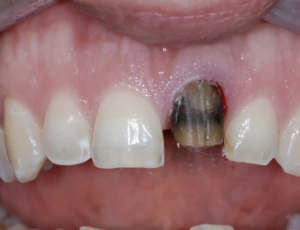You may not be aware, but there is a lot of controversy surrounding Root Canals. Many dentists are no longer performing Root Canals, and scientific research is beginning to shed light on the dangers of the practice. Yet the American Dental Association and other professional organizations insist that they are safe. What is the truth about root canals? Should you get one?
What is a Root Canal?
A Root Canal is a procedure in which the dead tissue and bacteria from a deep cavity is removed before being filled. The procedure is done when the cavity goes down into the root. The idea behind a Root Canal is to preserve the tooth, which is usually desirable for aesthetic appearances and effective chewing. Even though the tooth remains, the tooth is considered dead.
Is all the bacteria removed?
Scientific research has revealed that not all of the bacteria from the infected area is removed through a Root Canal. About 40 percent of bacteria is removed in most cases. In every case studied by researchers, at least some bacteria remained after the Root Canal.
Are root canal treatments safe? Watch this explainer from Natural and Cosmetic Dentistry

What is root canal treatment?
Root canals are traditionally described by conventional dentists, as a great way to save your natural tooth after it has been severely damaged or infected.
During a root canal treatment, the contents of the inner pulp chamber of the tooth, including the nerves and blood vessels are removed. Then the tooth is re-filled with a material called gutta-percha. The tooth is then sealed and capped with a crown.
Are there dangers associated with Root Canals?
While this procedure eliminates the pain for patients because the nerve in the tooth has been removed, it cannot completely remove toxins and bacteria.
These bacteria are free to grow and multiply in and surrounding the tooth, and since there is no nerve remaining in the tooth, patients do not sense pain if the infection grows. These bacteria can then enter the bloodstream to cause systemic problems throughout your entire body.
Also, the material used in the filling of the root canal can stimulate an immune response, which can cause patients to feel less than their best, and cystic lesions and scar tissue can form at the site of the root canal to affect your long-term oral health.
What are the alternative treatment options available to root canal therapy?
Avoiding the need for a root canal is the best alternative. Your greatest chance of never needing a root canal is to maintain good cleaning and hygiene practices.
In many cases, extracting the tooth with a simple and painless procedure can be a great choice, as it fully eliminates the source of infection.
Patients can then have the tooth replaced with a strong and durable zirconia implant, a partial denture, or a bridge that is fabricated from biocompatible materials.
Give us a call today to learn more about the alternative treatment options available to root canal therapy.
What are the dangers?
The bacteria that is left behind during a Root Canal can cause many health problems. While certain bacteria is common in the mouth, when it has led to an infection it becomes dangerous. Some of the conditions that may occur include malaise, inflammation and abscess in the head or neck. Infection in the mouth can also lead to seemingly unrelated health problems.
What should I do?
There are several alternatives to a Root Canal. To fully release the bacteria and heal the area, the tooth should really be removed. From there, you have several options such as a variety of dental implant methods, a bridge, or a partial. Each alternative has its advantages and disadvantages. If you would like to learn more about your options, contact us at Natural and Cosmetic Dentistry.
Watch the trailer below about the unexpected relationship of Root Canals to one’s health.





